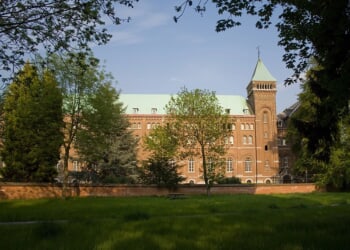Luke Graham was the Conservative Member of Parliament for Ochil and Perthshire South from 2017 to 2019, the candidate in Perth and Kinross-shire in 2024, and a former head of the Downing Street Union Unit.
This week Donald Trump landed in Scotland to tour his golf courses and celebrate his investments in his mother’s homeland. The international press braced for headlines while British security services prepared for the largest security operation since the death of HM Queen Elizabeth II.
Yet despite the protests, and some seemingly errant articles about Police Scotland refusing to support the security operation, by and large the US President’s visit has gone on without incident or major event.
Locals are split on the President’s visit; some see as an opportunity to voice their opposition to the current administration, others a chance to celebrate investment and jobs in their area while being able to snap a few pics with a global celebrity.
Although the trip has remained relatively trade focused, it was the President’s opening statement on landing on British soil that made the headlines which will undoubtedly echo through to the next Scottish and Welsh parliamentary elections. He stated that Europe had “got it wrong on immigration” and faced an “hostile invasion” of foreigners that have and will continue to damage our culture and states.
This statement was met with the usual barrage of press coverage and commentary. It was notable, however, that few politicians from the our political parties did much to counter the narrative or directly contradict the President’s claim. This should be unsurprising, since immigration remains a key political issue in the UK, with almost half of voters seeing it is as the top concern.
In fact, the latest polling by Norstat (May 27-30 2025) shows that 51 per cent of Scots back tougher immigration controls, bringing Scottish sentiment (on a previously differentiating topic) in line with those voters in England and Wales.
It is interesting then that the day after the President’s statement, Scottish residents were targeted with the Scottish Government’s latest pro-immigration and pro-nationalist digital advertisements that make clear that migration is a significant benefit to Scotland. The advert explains that thanks to immigration Scotland has more doctors, nurses and better public services.
Furthermore, the it asserts that Scotland is proud of its diverse communities and that due to falling population rates, there should a migration system “made in Scotland, for Scotland…for our people” i.e. nothing to do with England, which it is implied isn’t proud/diverse/sees the benefits of immigration.
Now, setting aside the supposed impartiality of official devolved government channels (no problem at all if this was an SNP advert) and the proper treatment of devolved and reserved competences (immigration is exclusively reserved to Westminster), the fact that the Scottish Government decided to launch a campaign highlighting the benefits of immigration at the same time the American president was attacking the UK’s and Europe’s immigration policies speaks volumes about where the SNP wants itself positioned for next year’s Holyrood elections.
Yet it should be noted that this carries significant risks for the SNP, with the majority of Scots now seeking tougher immigration controls and even 32 per cent of SNP supporters backing tougher measures.
The announcement of the Jeremy Corbyn left-wing party further threatens the SNP voter coalition.
For most of the past almost 20 years, the SNP has been able to rely on a mix of left-wing supporters and middle-class professionals to hold itself in power – preserving itself as the leading party in urban and many rural seats alike, and allowing the party to retain government, even in a system designed to promote broad coalitions and avoid single-party majority outcomes.
However, the political ground has shifted, and the SNP are still chasing their 2015 voter coalition, not what they need to in 2026. This is great news for Reform, who demonstrated their potential in the Hamilton, Larkhall & Stonehouse by-election, scoring just 3.3 per cent vote share behind the SNP.
This result was not just significant for Reform, but more importantly marked a continuation of the political alignment between England, Wales and Scotland that started in 2024 general election. Suddenly, after almost two decades of the SNP trumpeting Scottish exceptionalism and desperately trying to show the difference between Scotland and the rest of the UK, we see that voters in Scotland have had enough. They want the same things as everyone else on this island: better public services, improved life chances, and immigration at sustainable levels.
This alignment presents one of the strongest electoral opportunities for unionist parties in years; in order to capture it, it they need to relentlessly pursue the SNP and hold them to account for their dire treatment of Scotland, while carving out a uniquely Scottish offer in the Holyrood election that aligns (and leverages) the rest of the UK.



![Former Bravo Star Charged After Violent Assault Using a Rock-Filled Sock in Tennessee Walmart [WATCH]](https://www.right2024.com/wp-content/uploads/2025/07/Former-Bravo-Star-Charged-After-Violent-Assault-Using-a-Rock-Filled-350x250.jpg)



![NYC Man Snatches Child Off The Sidewalk, Parents Chase Him Down [WATCH]](https://www.right2024.com/wp-content/uploads/2025/07/NYC-Man-Snatches-Child-Off-The-Sidewalk-Parents-Chase-Him-350x250.jpg)
![Karoline Leavitt Levels CNN's Kaitlan Collins and Other Legacy Media Reporters [WATCH]](https://www.right2024.com/wp-content/uploads/2025/07/Karoline-Leavitt-Levels-CNNs-Kaitlan-Collins-and-Other-Legacy-Media-350x250.jpg)
![Man Arrested After Screaming at Senators During Big Beautiful Bill Debate [WATCH]](https://www.right2024.com/wp-content/uploads/2025/06/Man-Arrested-After-Screaming-at-Senators-During-Big-Beautiful-Bill-350x250.jpg)







